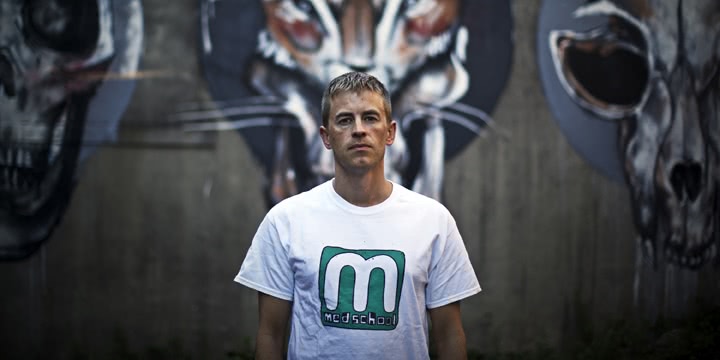It’s not always immediately apparent what your life’s work is meant to be.
For some, the path to creative fulfilment is a twisted one, and many of us walk about in circles for decades before we discover what we truly want to do with ourselves. Such is the case with Sydney’s Dylan Martin, a DJ and beatsmith who records under the name Royalston.
Martin says he didn’t grow up in a particularly musical household, and though he did always “listen to plenty of music”, it wasn’t until high school was done and dusted that actually producing songs occurred to him.
“I was 19 or 20 and very much into electronic music,” Martin explains. “But I never knew how it was made. I needed to make a soundtrack for an animation I’d made and a friend gave me a copy of Acid. I just got really hooked on that and slowly it took over my life. I knew then that that was what I wanted to do, but it took a long time to realise it.”
That said, even when making music began to fill up more and more of Martin’s time, it was never smooth sailing. He freely admits that performing live was something he struggled with – even to this day he says it only feels natural on “some nights”, and his beginnings as a performer were full of screw-ups. “The first DJ gig I played was in maybe 2000,” he says. “I’m pretty sure it sucked, but I know I was having fun.”
Nonetheless, Martin did have a trick up his sleeve: his classical training. He embarked upon musical education in earnest after high school, and has found his knowledge now imbues him with strong reserves of both confidence and creativity. “Musical theory gives you a good set of tools to figure out why something works or even why a mix might have a problem,” he says. “It definitely affects the way I write harmonies and melodies. My classical training is very scattered – I got it from lots of different people and places, so I always wish I had more. I still try and study theory when I can.”
That deliberate, academic element of Martin’s music is often its defining quality. Though the tunes he makes are never cold, there is always a very obvious sense of control to them – they never tip over into chaos, no matter how often they threaten to, and to listen to a song like ‘Scalps’ is to find oneself in the hands of a singularly talented musician.
Indeed, the record ‘Scalps’ comes from, People On The Ground, is so free from blemish as to appear almost bleached clean. Described by its creator as “forward-thinking drum and bass”, the work touches on a number of electro subgenres, mixing up a strong trap influence with soulful vocals and samples and sometimes disturbing, dark noise work. “People On The Ground took about a year and a half to write,” Martin explains. “There were a few tunes on it left over from [EP] OCD. Some tunes took three months and others were done in a day or two.”
Admittedly, three months is an agonisingly long time to write a track, but for Martin, songs often need a while to stew. He frequently finds that his work can take unexpected left turns, and for him, writing a record is much more a process of discovery than it is a strict case of following a formula or drawing up a blueprint. “Songs change completely,” he says. “Most don’t end up at all how they start. Many go down huge long stupid diversions and then I realise version one was the best, months later. Some tracks even become two or three separate tunes by the time they are done.”
Ultimately, a record isn’t really completed for Martin until he has released it out into the world. He relishes playing live, even if doing so causes him no small degree of nerves. That said, it’s not always easy to gauge the audience’s response, and when asked how he keeps his sets fluid and the crowd engaged, he speaks with the thoughtful determination of someone trying very hard to master the fine art of the live performance.
“I try and pay attention to how the audience is going and try not to go into my own zone too much if possible. I play a lot of tunes quite quickly, so moods can shift fast. The set-up for the gig can really make a real difference in this regard: if you’re down next to the crowd you can feel how each track goes down, but sometimes on a stage you can feel a bit separated – especially if the lights are right on you and you can’t see the audience properly.”
But even if it’s not always clear to Martin whether his beats are going down well, it is more apparent to outsiders – people who can watch in wonder as his committed fans lap up each and every track he dishes out. After all, some of his followers are so dedicated, they’ve even taken to distributing his music themselves. “My dad, who lives and works in Indonesia, buys lots of copies of my album,” Martin says. “Whenever he catches a taxi he always gives a copy to the driver.”
Surveillance Party Lockout happensSaturday November 12 atOxford Art Factory; and Royalston’sPeople On The Ground is out now through Med School/Hospital.


































